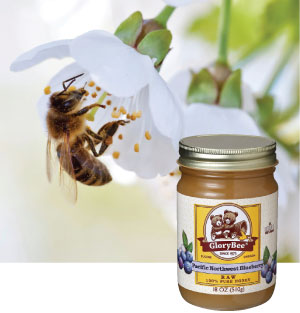Save the bee
This article was originally published in October 2013

Join PCC and GloryBee Foods in saving the honeybee. Bees not only provide us with honey, but they also pollinate more than one-third of our food crops, worth billions of dollars in Washington and Oregon alone.
As part of GloryBee’s mission to support ongoing education about the decline of bee populations, the company is working closely with the Oregon State University (OSU) Bee Lab and other apiary associations across the nation to facilitate education about bees.
GloryBee’s donations to the OSU Bee Lab have supported research about combating bee diseases, nutrition concerns, parasites, genetic problems and many other issues linked to Colony Collapse Disorder (CCD). This research is helping commercial and backyard beekeepers support healthy hives in light of the complex problems facing honeybees.
PCC is happy to partner with GloryBee on this important initiative. GloryBee is donating 1 percent of revenue to its Save the Bee program. GloryBee already has donated $10,000 to OSU and likely will double that amount in 2013. Look for GloryBee honey — available in jars and bulk — on sale this month at PCC.
New CCD research
Scientists have struggled to find the cause of Colony Collapse Disorder (CCD) that has wiped out an estimated 10 million beehives, worth $2 billion, over the past six years.
Now, a new study has pinpointed some of the probable reasons for the massive die-off. The results show they’re more complex than previously thought. A study published in the journal PLOS ONE by scientists at the University of Maryland and the U.S. Department of Agriculture has identified a cocktail of pesticides and fungicides contaminating pollen that bees collect to feed their hives.
When researchers collected pollen from hives pollinating cranberry, watermelon and other crops, they found the pollen was contaminated on average with nine different pesticides and fungicides. They discovered 21 agricultural chemicals in one sample.
Most disturbing, bees that ate pollen contaminated with fungicides were three times as likely to be infected by the parasite Nosema ceranae, which is linked to CCD. The finding is notable because fungicides are used widely and had been thought to be harmless for bees as they’re designed to kill fungus, not insects, on crops such as apples.
A class of chemicals called neonicotinoids has been linked to bee deaths and in April regulators banned the use of neonicotinoids for two years in Europe, where bee populations also have plummeted. But the researchers say this new study shows it’s the interaction of multiple pesticides affecting bee health. Read more about the study »
Other findings:
- Insecticides and fungicides were in every hive, and herbicides in nearly a quarter.
- Organophosphates — an insecticide class known to be a powerful neurotoxin — were found in 63.2 percent of the hives.
- Bees fed with fungicide-laced pollen were two times more likely to come down with an infection than control bees.
Did you know?
- Bee populations are so low in the United States that it now takes 60 percent of the country’s surviving colonies just to pollinate one California crop, almonds.
- A honey bee visits 50 to 100 flowers during a pollen-collecting trip. It takes one colony of honeybees (around 30,000 bees) to pollinate an acre of fruit trees.
- Bees pollinate one-third of our crops, including melons, berries, citrus fruits, nuts and more. The value of crops they pollinate is $30 billion.
- A single bee colony can produce more than 100 pounds of honey.
